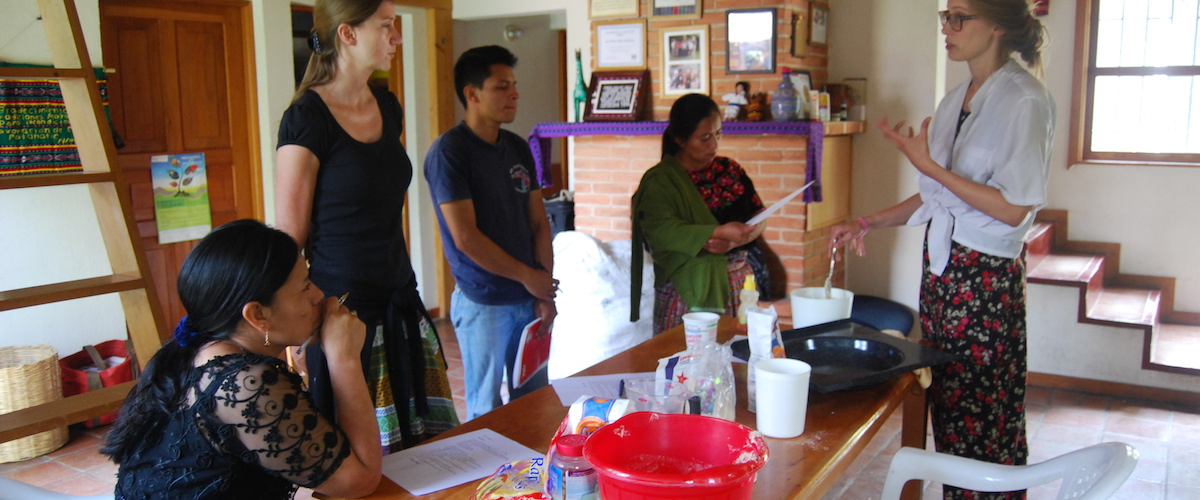WASHINGTON, DC | December 15, 2014 - This week on BIZ+SOCIAL, we bring you the best from SSIR, Devex Impact, Moving Worlds, and more.
GLOBAL PRO BONO
‘Experteering’ — A New Way to Pool Top Talent for Social Impact
Finding the right type of professional to implement a development program can be extremely tough — and even more so if you can’t afford top-tier talent. That’s why many organizations are looking to firms like MovingWorlds, which connects specialists in their field who want to travel and volunteer their expertise with social impact firms that need their services. “Experteering,” as MovingWorlds calls it, seeks to move beyond traditional volunteerism and grow a global network of professionals who want to do good and match their skill sets to create high-impact engagements. Find out more about how this model works in this Devex video interview with Mark Horoszowski, co-founder of MovingWorlds, on the sidelines of the U.S. Chamber of Commerce Foundation’s Corporate Citizenship Center conference last September. Watch Here…
IMPACT & INNOVATION
When Will Design Get Serious About Impact?
Interest in human-centered design (HCD) has been building in the public sector and international development over the last few years thanks to Clinton Global Initiative and other forums. I no longer get puzzled expressions when I mention that there are designers working at UNICEF and the World Bank—and not on designing printed brochures and collateral. Melinda Gates famously visited IDEO.org last year and subsequently placed HCD at the top of her list of innovations that have had a profound impact on people’s lives: Human-centered design is about meeting people where they are and really taking their needs and feedback into account. “When you let people participate in the design process, you find that they often have ingenious ideas about what would really help them. And it’s not a onetime thing; it’s an iterative process. Design has arrived on the scene, but will this interest be sustained? Right now, design seems to be riding the coattails of a number of issues that are top of mind for funders, implementers, and governments…Read More…
LEADERSHIP
Supporting Nonprofit Leadership: A Pre-Flight Briefing
Like many of us, I spend an inordinate amount of time on planes, and over time, I have come to appreciate flying as a rare sanctum for reflection. One ritual in this sphere, the pre-flight safety demonstration, ranks among my favorite: It offers preparation and instruction for the unexpected, and highlights the service and amenities that accompany the journey. Investing in nonprofit leadership development, as others in this series have shown, is a high-leverage strategy that can further the goals of any foundation. It is not a one-off, transactional proposition but a dynamic, iterative voyage. This piece offers a “pre-flight briefing” for foundations on (or curious about) this journey. The Levi Strauss Foundation is carrying out a five-year initiative called Pioneers in Justice in our hometown of San Francisco—a cradle of innovation in civil rights and technology. We are supporting five nonprofit leaders who are shaping the next wave of social justice work as they use the power of social media and networks to advance their missions and movements. In June, we published a case study by Heather McLeod Grant on the initiative’s textured results and lessons; recently she contributed a handy overview of her findings. Read More…
ENTERPRISE DEVELOPMENT
An Absorbing Problem
 Increasingly, leaders are acknowledging that isolated approaches to fixing the most challenging social problems—problems such as growing economic disparity and failing urban systems—have not worked. As a consequence, there is a growing interest in approaches to social change that transcend any one sector, locale, or issue. My organization, Living Cities, created the Integration Initiative (TII) partly in response to that trend. Launched in 2010, TII is an $85 million effort to help cross-sector groups of local leaders to explore potentially needle-moving outcomes for low-income people. (I discussed the origins of TII in “Revitalizing Struggling American Cities,” an article that appeared in the fall 2011 issue of SSIR.) In its initial phase, TII targeted a series of seemingly intractable problems in five US cities: workforce development in Baltimore, economic development in Cleveland, urban revitalization in Detroit, equitable transit-oriented development (TOD) in Minneapolis- St. Paul, and education and health in Newark. After three years, we undertook an assessment of our relationship with each site. As a result of that review, we have improved our understanding of the challenges that are likely to affect any ambitious effort to confront systemic urban problems. Read more…
Increasingly, leaders are acknowledging that isolated approaches to fixing the most challenging social problems—problems such as growing economic disparity and failing urban systems—have not worked. As a consequence, there is a growing interest in approaches to social change that transcend any one sector, locale, or issue. My organization, Living Cities, created the Integration Initiative (TII) partly in response to that trend. Launched in 2010, TII is an $85 million effort to help cross-sector groups of local leaders to explore potentially needle-moving outcomes for low-income people. (I discussed the origins of TII in “Revitalizing Struggling American Cities,” an article that appeared in the fall 2011 issue of SSIR.) In its initial phase, TII targeted a series of seemingly intractable problems in five US cities: workforce development in Baltimore, economic development in Cleveland, urban revitalization in Detroit, equitable transit-oriented development (TOD) in Minneapolis- St. Paul, and education and health in Newark. After three years, we undertook an assessment of our relationship with each site. As a result of that review, we have improved our understanding of the challenges that are likely to affect any ambitious effort to confront systemic urban problems. Read more…
CITIZEN DIPLOMACY
If You Want to Help as a Volunteer, Shut Up and Listen
 I spent a year traveling and volunteering my skills around the world, only to learn what others already knew: “If you want to help, shut up and listen.” The great irony of voluntourism is that we tend to overemphasize our willingness – and “selflessness” – to help, but in doing so, we forget to be honest with ourselves and others that it is a selfish endeavor. This is also why we started a shift towards skill volunteering, or as we say, Experteering. The truth is that we all want unique and story-worthy international experiences. We want them so badly we’ve created an industry where it’s OK to pay for these “voluntourism experiences.” Yet that simple act of paying erodes our own experiences for three reasons: We create a customer-client relationship, not a partnership, with our hosts. By paying a hosting organization, it “owes” you and will conform to your needs, often at the expense of its own best interests. We erode sustainability. In order to survive, social-impact organizations are encouraged to pivot their business models away from serving their beneficiaries, and instead work to host as many volunteers as possible. We engage in work that is not badly needed. When we look to do specific things in specific areas, and are willing to pay for it, organizations are financially rewarded for doing what you want, not what is needed. In order to avoid these pitfalls, we don’t need better programs or services. Read More…
I spent a year traveling and volunteering my skills around the world, only to learn what others already knew: “If you want to help, shut up and listen.” The great irony of voluntourism is that we tend to overemphasize our willingness – and “selflessness” – to help, but in doing so, we forget to be honest with ourselves and others that it is a selfish endeavor. This is also why we started a shift towards skill volunteering, or as we say, Experteering. The truth is that we all want unique and story-worthy international experiences. We want them so badly we’ve created an industry where it’s OK to pay for these “voluntourism experiences.” Yet that simple act of paying erodes our own experiences for three reasons: We create a customer-client relationship, not a partnership, with our hosts. By paying a hosting organization, it “owes” you and will conform to your needs, often at the expense of its own best interests. We erode sustainability. In order to survive, social-impact organizations are encouraged to pivot their business models away from serving their beneficiaries, and instead work to host as many volunteers as possible. We engage in work that is not badly needed. When we look to do specific things in specific areas, and are willing to pay for it, organizations are financially rewarded for doing what you want, not what is needed. In order to avoid these pitfalls, we don’t need better programs or services. Read More…
MORE
Ebola: Tightening the Web of Corporate Response
International Corporate Volunteering Programs Critical to Development Efforts


